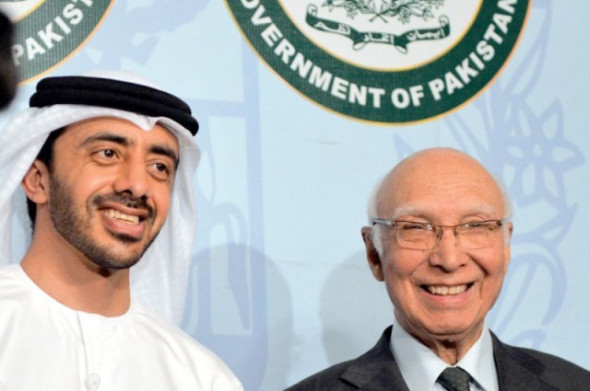The recent decision to bolster trade and investment relations between Pakistan and the UAE represents a positive step in enhancing Pakistan’s economic standing within the region. At the Joint Ministerial Commission of Pakistan and the United Arab Emirates, Prime Minister’s Adviser on National Security and Foreign Affairs Sartaj Aziz said that “tangible economic gains” had paved the way for deepening bilateral trade ties.
The UAE Foreign Minister Shaikh Abdullah bin Zayed Al Nahayan spoke of removing “irritants” to ensure the development of commercial relations. Though the UAE is Pakistan’s largest trading partner with annual bilateral trade at $10 billion, the UAE Foreign Minister said that the “ambition and potential” for trade was far higher. With the object of advancing trade ties, a Memorandum of Understanding was signed between the Securities and Exchange Commission of Pakistan and Securities and Commodities Authority of the UAE. A joint trade council has also been established to promote trade and business between Pakistan and the UAE.
The UAE government also expressed interest in exploring opportunities in Pakistan’s renewable energy sector. Renewable energy projects are being pursued to overcome Pakistan’s ongoing energy crisis which continues to gravely threaten its economic future.
Over the years, the UAE has provided substantial economic assistance to Pakistan, particularly during times of crisis including in the aftermath of the 2010 floods. The President of the UAE, His Highness Sheikh Khalifa bin Zayed Al Nahayan ordered the immediate delivery of relief material to shelter displaced people in the flood stricken areas. Similarly, in the wake of the 2005 earthquake, the UAE government provided unconditional support to Pakistan.
Sustaining peace within the region remains the best way forward for deepening ties with all trading partners. With a view to consolidate regional relations, Prime Minister Nawaz Sharif boldly asserted that Pakistan was willing to go the “extra mile” to realise lasting peace with India. He also called for a resolution of the historically contentious Kashmir issue through dialogue, “Kashmir, of course, is a very difficult issue and very difficult to resolve but I think, by sitting and talking, we will be able to find some way of resolving that, too,” said Prime Minister Nawaz Sharif at the U.S. Institute of Peace, “Because that is a flashpoint not only in the region, but the whole world.”
The seemingly intractable problem of Kashmir has precluded any meaningful peace between the neighbouring countries for decades. In fact, fierce clashes between Pakistani and Indian forces in recent months have resulted in heightened animosity between the two nuclear rivals. Sadly, the colonial legacy of ‘divide and quit’ continues to wreak havoc with overlapping identities and territories still being negotiated and redefined, largely through violence.
Ongoing border incursions and protracted tensions with India starkly illustrate how the trauma of occupation, partition and dislocation continue to reverberate across the subcontinent to this day. In spite of the shared history and the increasingly collaborative cross border cultural endeavours between the two countries, recurring cross border strife indicate that the wounds of the past have not yet healed.
Prime Minister Nawaz Sharif’s overtures for pursuing peace represents a shift from the past with a view to recast the relationship into a more mutually beneficial and productive arrangement to ensure peace and prosperity in South Asia.






